
15 Jul 2024
Looking at life differently: Hugh’s CLL story
Leukaemia UK Community Champion Hugh Pender’s leukaemia diagnosis came about in unusual circumstances due to a totally unrelated condition. The super fit runner, swimmer and cyclist was still actively participating in the popular Iron Man fitness events when he received his shock diagnosis – and has continued to compete since having treatment.
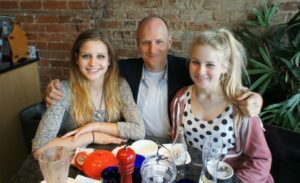
Hugh with his daughters
“In December 2007 I broke my right clavicle when I fell off my bike,” said Hugh, now 65, who’s retired from the aerospace industry, from Devizes in Wiltshire. “I had to have a general anaesthetic to screw it back together with a hook plate. That was in place for four months then I had another general anaesthetic to have the screws and plate removed in April 2008. In the months after the second operation, I was very tired, so I went to see my GP. He suggested it could be the lasting effects of the anaesthetic but decided to do a full blood count test in case it was something else.
“I came back from holiday in August 2008 to a letter asking me to go for another blood test. My results had showed slightly raised lymphocytes. The second test showed the same thing. More tests were done, and at that point the GP suggested there was a possibility of chronic lymphocytic leukaemia (CLL).”
At the end of September 2008, Salisbury Hospital’s haematology department confirmed that Hugh did indeed have CLL. He was 49.
“The GP said an appointment would be arranged with the hospital where I could have a discussion with the haematologist. I left the GP surgery, sat in my car and cried. It was such a shock.”
The hospital consultant told Hugh he would be on a ‘watch and wait’ treatment programme with regular blood tests to see how his leukaemia was developing.
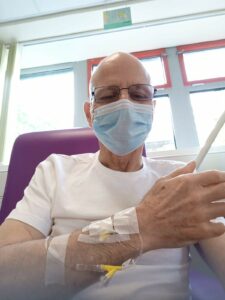
Hugh during treatment
“In the weeks and months after the diagnosis I turned to the internet and researched CLL. I was angry that this had happened to me and couldn’t work out why. I needed answers but there didn’t seem to be any. I remember thinking I may not see my daughters grow up – they were aged 14 and 9 at the time. I found comfort in books on philosophy and psychotherapy. These opened a whole new world to me where I realised that I didn’t need to know why I had leukaemia but could just throw myself into the experience, learn about it, even enjoy the process and help others if I could.
“My wife Sarah found the diagnosis really difficult to get her head around. We found the initial months the hardest as we had no idea what the future would bring. She had a sense of doom at a future that had been changed. I started to plot a graph showing my lymphocytes. My levels were increasing, and this was a visual way of us being able to see that. Although never complacent and realising at any time that things could escalate, each blood test reassured us that we had time to learn to live with this diagnosis and our lives gradually returned to being more ‘normal’.
“When I was diagnosed, we initially decided not to share the news with our daughters as there was so much unknown about how things would develop. Over the years we did share with them and this had a profound effect on them, leaving our youngest daughter with anxiety. It was, however, the right decision to share the diagnosis as we are a very ‘honest’ family where we discuss everything and anything. The initial secrecy weighed heavily on my wife. It took a long time to share the diagnosis with family and friends and their reactions were mixed. We have still not shared it with our aged parents as we always hoped we would never have to. This was tricky during treatment but was the right decision.”
Hugh continued with his work, family life and sports competing for over a decade until in 2021 his blood levels started to show a consistent rise. He also had severely swollen lymph nodes in his neck and groin, and a scan revealed he had an enlarged spleen which accounted for his feeling of breathlessness.
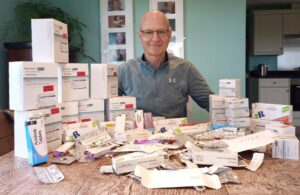
Hugh with empty treatment packets
“Over the 13 years I had seen the same consultant every three or six months – Dr Jonothan Cullis at Salisbury Hospital. We have built up a great relationship. I would aim to keep abreast of the latest research and treatment options and discuss this when I saw him as well as ask any questions I may have. By the time I needed treatment in June 2021, I had a fair idea of the drugs that would help my condition. Dr Cullis knew this and offered me options, saying: ‘Looking at your blood results and CT scan, we need to get you into treatment. What drug regime do you want?!’.”
Hugh opted for monthly Obinutuzumab infusions for eight months, and daily Venetoclax tablets for 12 months. Various other drugs were necessary including anti-virals, sleeping tablets, and a steroid hormone infusion.
“The treatment was manageable. There was plenty of discomfort, some sickness, sensitivity to sound and light, needles, and tests. But the staff at the hospital were fantastic, so friendly and professional. But of course, it has been tough. My wife and daughters were really supportive through everything always assuring me that I would get through it.
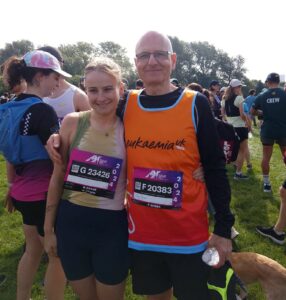
Hugh running the Hackney Half Marathon in 2024 for Leukaemia UK
Hugh’s wife Sarah said: “Throughout this whole journey there have been moments of panic as the reality of my husband’s leukaemia faced our family. Most of the time we were able to put it to the back of our minds and get on with living but every so often there would be a spike in lymphocytes which frightened us. The period of treatment was a time of uncertainty for us all, not least because it happened during Covid. I had to adjust my working as a primary teacher to isolate with him and protect him from picking up any infection, and my daughters, who were at Uni at this time, were unable to come home for longer than would have been necessary after lockdown restrictions were lifted because of his vulnerability. This was hard for all of us.”
“We know how lucky we have been that treatments had moved on so effectively in the 13 years of ‘watch and wait’ and are very grateful for the research and development that lead to such an amazing outcome for him and others.”
“The leukaemia has been gone for over two years now,” said Hugh. “I am not on any other treatments and feel great. The timing for me was particularly important as my drug protocol had only been approved a few months beforehand. Looking at the current research data there is a strong chance that the CLL will come back after around five years. I see that as five more years of research into new treatments so it doesn’t worry me. I firmly believe my fitness and positive mental attitude have helped me a great deal. I will deal with it if it comes back.
“I retired in 2022 and hope to have a leukaemia-free retirement. For me it has in many ways been a positive experience, forcing me to look at my life slightly differently, accept what comes along, work out how I can best deal with it and remain positive throughout. I firmly believe a positive outlook and a healthy lifestyle may contribute to the course of the disease.”
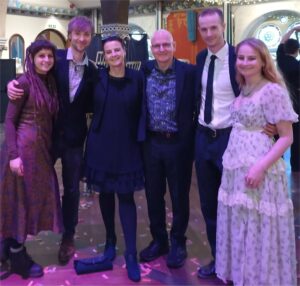
Hugh with his family
Through his involvement with another leukaemia charity, Hugh heard about Leukaemia UK’s appeal for Community Champions – volunteer patients and relatives help campaign for improvements in diagnosis, treatment, care and research.
“Volunteering as a Leukaemia UK Community Champion is a fantastic opportunity to get out into the community promoting the need for better research and treatments and at the same time meet many lovely people from the staff at Leukaemia UK and other wonderful volunteers. It’s also a great way to give back for all the treatments that I’ve benefitted from. I really enjoy being able to promote the need for better research and treatments, and I know Leukaemia UK’s work will benefit more people like me in the future.”
Discover more stories from our community.
Related posts
1 August 2022
Who’s Cooking Dinner? to return on Monday 19th September
Who’s Cooking Dinner reveal all star Chef Line Up Famed Charity event to return on Monday 19th September For the past 24 years, Leukaemia UK, the leukaemia research charity dedicated…
21 April 2023
Trailblazing research project announced to exploit novel weaknesses in one of the least survivable cancers
A pioneering new study hopes to accelerate progress towards a new treatment for acute myeloid leukaemia (AML) in research announced today on World AML Day by Leukaemia UK. University of…
9 January 2018
Blood cancer and your emotions – an expert’s insight
Specialist blood cancer counsellor Philip Alexander explains why talking therapies can form a crucial part of treatment
20 September 2021
Leukaemia charities unite in Blood Cancer Awareness Month to improve diagnosis and the chances of survival
Leading UK leukaemia charities Leukaemia Care and Leukaemia UK have announced a new collaboration to increase awareness of the signs and symptoms of leukaemia and drive improvements in the diagnosis of the disease. The campaign, Spot Leukaemia, is running throughout September – Blood Cancer Awareness Month.